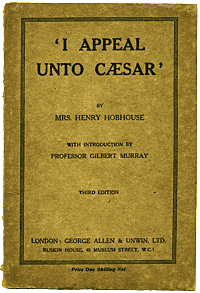|
OBJECTING TO WAR
FIRST CO TO DIE
2 EUROPE GOES TO WAR
3 COUNTDOWN TO CONSCRIPTION
4 FUNDAMENTAL CHANGE IN SOCIETY
5 NO CONSCRIPTION FELLOWSHIP
6 THE SECRET PRESS
7 MANY TRADITIONS
8 THE TRIBUNALS
9 TRANSCRIPS
10 THE 'won't-fight-funks'
11 THE COST OF CONSCIENCE
12 UNWILLING SOLDIERS
13 ALTERNATIVES AND DILEMMAS
14 PRISON
15 THE MEN SENTENCED TO DEATH
16 COERCION FAILS
17 DYCE
18 DARTMOOR
19 THEY WORK IN OVERCOATS
20 THE MEN WHO DIED
21 WINDING DOWN
21 SELECTION OF BOOKS
22 FROM CALL UP TO DISCHARGE
WHY WAR? supplement
|

I Appeal Unto Caesar recorded information about COs who came to be called the 'absolutists' ::>
Two views on opposition to war

|
7 MANY TRADITIONS
Conscientious objectors came from many varied walks of life and traditions. They were able to look at the history of people who had dissented in the past, and so increase their knowledge and reassure themselves about the morality of their protest. Some, for example, turned to Jesus’ Sermon on the Mount for support. Others referred to the peace movements of the 19th century, which condemned war as a crime against humanity. Yet others were inspired by the American writer Henry David Thoreau, who had refused to pay war taxes. But even with such a rich history, conscientious objectors, whatever their ability to cope with often rude and agressive interviewers, would have a hard time ‘convincing’ the seldom receptive or sympathetic members of the tribunals before whom they stood.
Over 16,000 men claimed exemption for reason of conscience. When appearing before a tribunal some didn't get a chance to say a word, others embarked on well-prepared arguments. Whatever they said, the result was the same: only a handful received full exemption, and many were denied any form of exemption at all.
Some COs did not feel the need to convince tribunals. These – the ‘absolutists’ – not only refused to bear arms, they also refused to act on any dictates of the state. By opposing conscription they rejected war. By refusing to have their conscience overruled they challenged the generally accepted authority of the state. This was a new experience for the people in authority, and many found it threatening.
|
